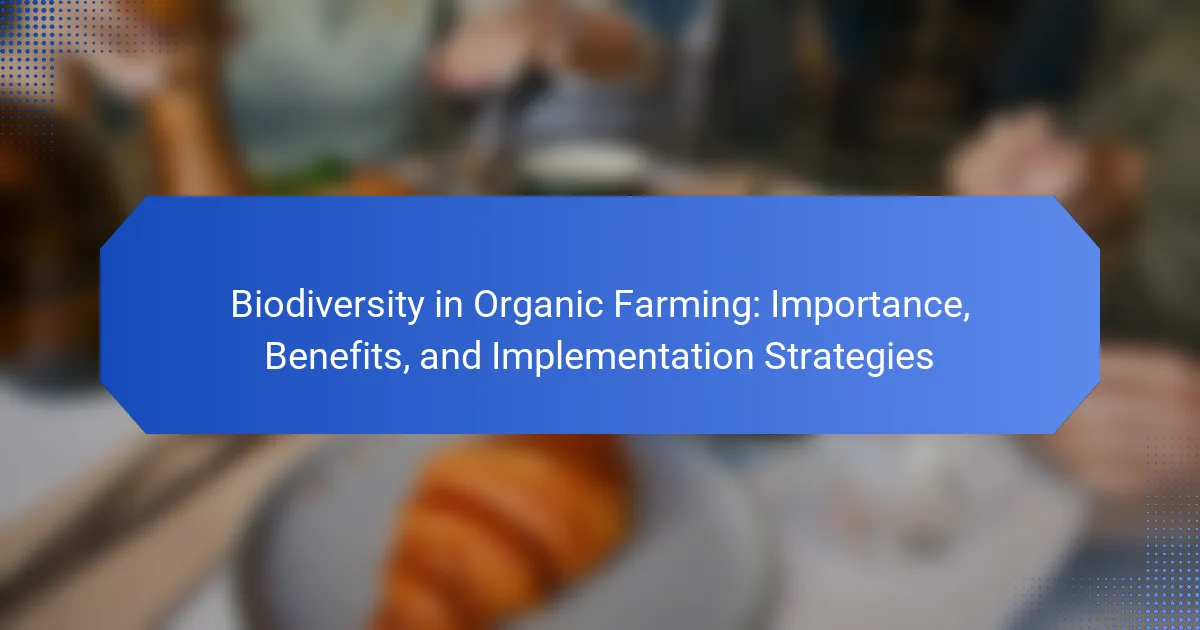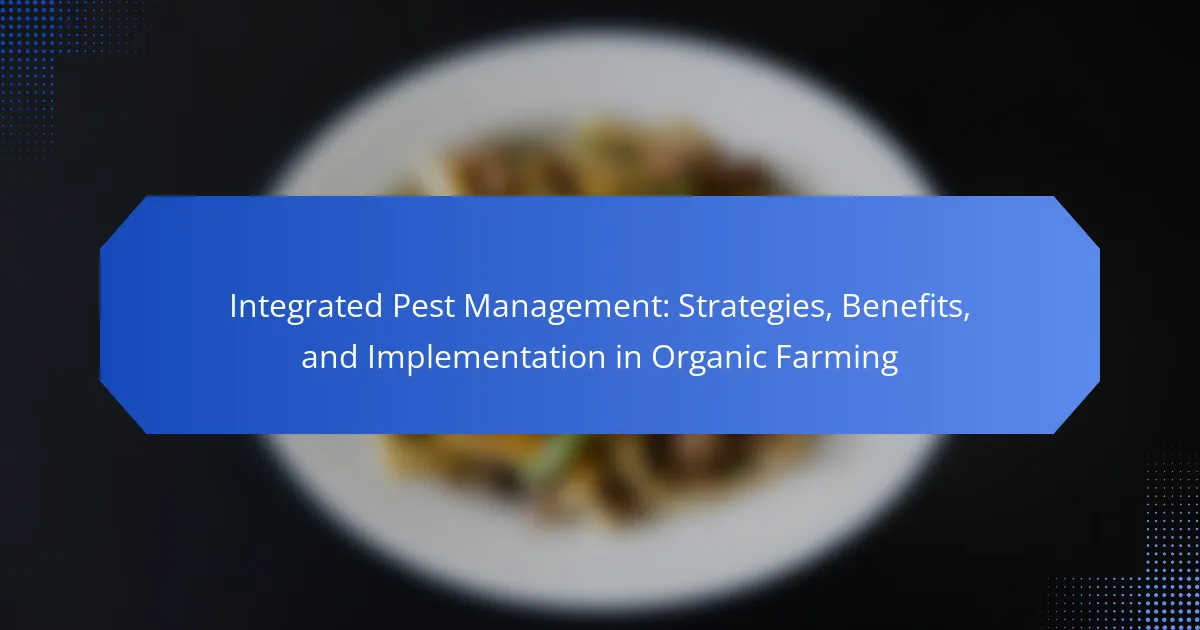The Organic Certification Process is a systematic procedure designed to verify that agricultural products adhere to established organic standards. This process involves developing an organic system plan, applying for certification through an accredited certifying agent, and undergoing an on-site inspection to ensure compliance. While the certification process promotes sustainable farming practices and enhances environmental health, it also presents challenges such as complex regulations, time-consuming documentation, financial costs, and limited market access for uncertified producers. Ultimately, the Organic Certification Process plays a crucial role in maintaining the integrity of organic products and fostering consumer trust.
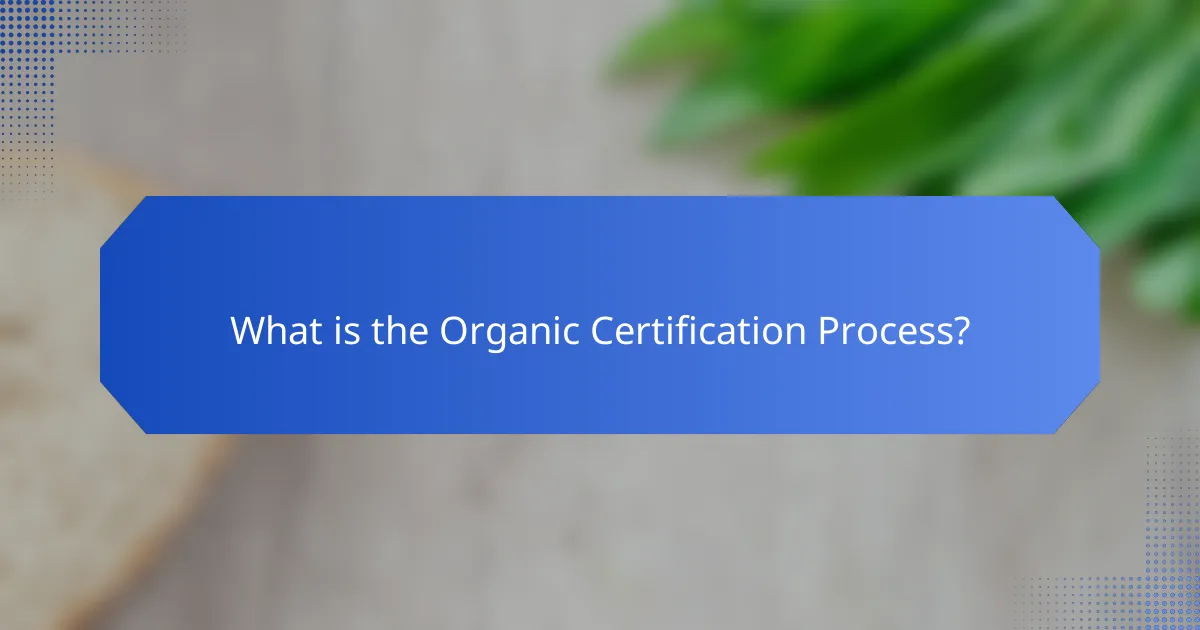
What is the Organic Certification Process?
The Organic Certification Process is a systematic procedure for verifying that agricultural products meet organic standards. This process involves several key steps. First, farmers or producers must develop an organic system plan. This plan outlines their farming practices and how they will comply with organic regulations. Next, they must apply for certification through an accredited certifying agent. The certifying agent reviews the application and conducts an on-site inspection. During the inspection, the agent verifies compliance with organic standards. After a successful inspection, the certifying agent issues an organic certificate. This certificate confirms that the products are organic and can be marketed as such. Compliance with the certification process is essential for maintaining organic integrity and consumer trust.
How does the Organic Certification Process work?
The Organic Certification Process involves several key steps to ensure compliance with organic standards. First, a farm or business must apply for certification through a USDA-accredited certifying agent. Next, the applicant undergoes a thorough review of their practices and procedures.
This includes submitting an Organic System Plan detailing how they will meet organic standards. The certifying agent then conducts an on-site inspection to verify compliance with these practices. After the inspection, the certifying agent evaluates the findings and determines whether to grant certification.
If approved, the operation receives an organic certificate, allowing them to market their products as organic. Regular inspections and annual renewals are required to maintain certification. According to the USDA, certified organic operations must adhere to strict guidelines regarding the use of synthetic fertilizers and pesticides.
What are the key steps involved in the Organic Certification Process?
The key steps involved in the Organic Certification Process include application, inspection, and compliance. First, an applicant submits an organic certification application to an accredited certifying agent. This application outlines the farm’s practices and products. Next, an on-site inspection is conducted by the certifying agent. This inspection verifies compliance with organic standards. After inspection, the certifying agent reviews the findings. If compliant, the agent issues an organic certificate. Annual inspections are required to maintain certification. This process ensures adherence to the USDA organic regulations.
How do different certifying bodies operate within the Organic Certification Process?
Different certifying bodies operate within the Organic Certification Process by establishing standards and procedures for organic farming. Each body is accredited by a national authority, such as the USDA in the United States. They conduct inspections and evaluations to ensure compliance with organic standards. Certifying bodies assess farming practices, inputs, and record-keeping. They also provide guidance to farmers on meeting certification requirements. The process includes annual inspections and a review of farm management practices. This ensures ongoing compliance with organic regulations. The diversity of certifying bodies allows for regional adaptations of organic standards.
What are the requirements for Organic Certification?
To achieve Organic Certification, entities must adhere to specific standards set by regulatory bodies. These standards typically include using organic seeds and preventing contamination with non-organic substances. Entities must also maintain detailed records of their farming practices and inputs. Soil health must be managed through organic practices, such as crop rotation and composting. Additionally, entities must undergo annual inspections by accredited certifying agents. Compliance with these requirements ensures that products meet the organic label criteria established by the USDA or equivalent organizations.
What documentation is needed for the Organic Certification Process?
The Organic Certification Process requires specific documentation. Applicants must submit an organic system plan detailing their farming practices. This plan should include information on soil management, pest control, and crop rotation. Records of inputs used, such as seeds and fertilizers, are also necessary. Documentation of compliance with organic standards is essential. This includes records of inspections and any corrective actions taken. Additionally, proof of non-GMO status for seeds must be provided. Financial records showing the costs and revenues associated with organic production may also be required. Each certifying agent may have specific documentation requirements, so it’s important to check with them directly.
How do farming practices affect eligibility for Organic Certification?
Farming practices directly influence eligibility for Organic Certification. To achieve this certification, farms must adhere to specific agricultural methods. These methods include avoiding synthetic fertilizers and pesticides. Instead, organic farms utilize natural inputs and sustainable practices. Crop rotation and cover cropping are essential practices that enhance soil health. Additionally, the use of genetically modified organisms (GMOs) is prohibited. Compliance with these practices is monitored through a certification process. The USDA National Organic Program outlines these requirements clearly. Farms must maintain records to demonstrate adherence to organic standards.
What benefits does Organic Certification provide?
Organic certification provides numerous benefits for producers and consumers. It enhances marketability by allowing products to be labeled as organic, which can attract a premium price. Certified organic products often have a higher consumer demand due to growing health and environmental concerns.
Additionally, organic certification can improve farm management practices, leading to better soil health and biodiversity. It also supports sustainable farming methods, which can reduce the use of synthetic pesticides and fertilizers.
Research indicates that organic farming can lead to increased profitability over time. A study by the Rodale Institute found that organic farms can yield comparable or higher profits than conventional farms in the long term.
Overall, organic certification fosters consumer trust and promotes environmentally responsible practices.
How does Organic Certification impact consumer trust and marketability?
Organic Certification significantly enhances consumer trust and marketability. It assures consumers that products meet rigorous organic standards. This certification often leads to a perception of higher quality and safety. According to a 2021 survey by the Organic Trade Association, 82% of consumers trust organic labels. Additionally, certified organic products typically command higher prices in the market. A study by the USDA found that organic produce can sell for 20-100% more than conventional counterparts. Therefore, organic certification not only builds consumer confidence but also improves sales potential.
What economic advantages can certified organic products offer to farmers?
Certified organic products can offer significant economic advantages to farmers. These products typically command higher market prices compared to conventional goods. According to the USDA, organic produce can sell for 20% to 100% more than non-organic varieties. This price premium can lead to increased revenue for farmers. Additionally, organic farming often results in lower input costs over time. By using natural fertilizers and pest control, farmers can reduce their dependence on expensive chemical inputs.
Furthermore, the demand for organic products is steadily rising. The Organic Trade Association reported that U.S. organic sales reached $62 billion in 2020, indicating a growing consumer preference. This trend provides farmers with more opportunities to enter lucrative markets. Lastly, certified organic status can enhance a farmer’s brand reputation. Consumers often perceive organic products as healthier, which can attract a loyal customer base.
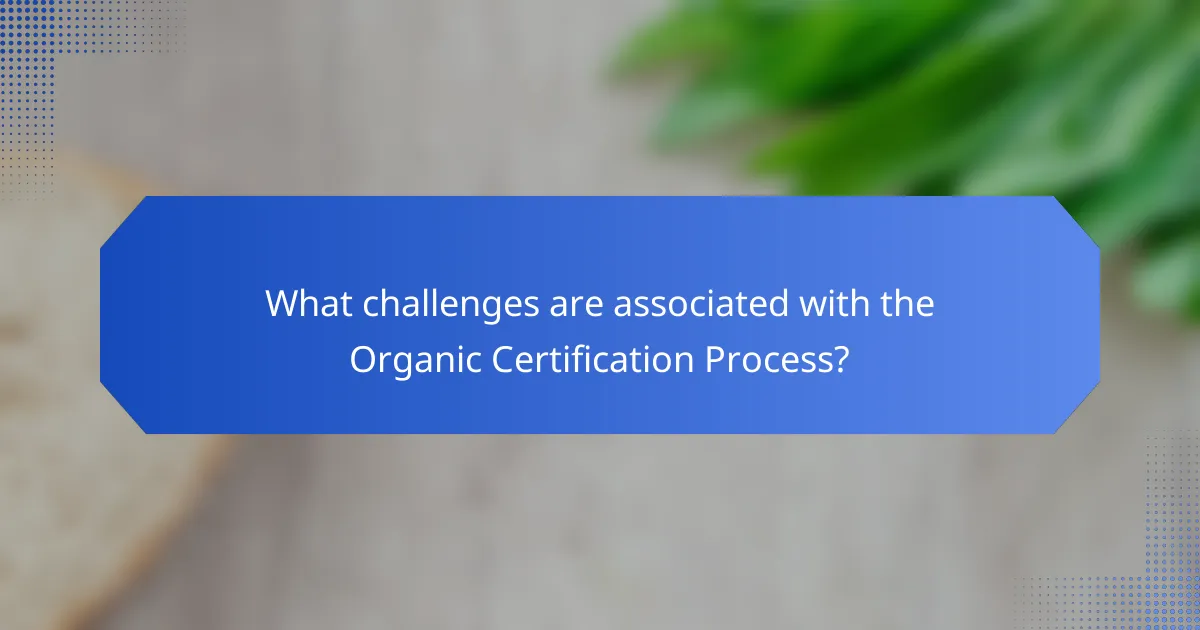
What challenges are associated with the Organic Certification Process?
The Organic Certification Process faces several challenges. One major challenge is the complexity of regulations. Different countries have varying standards for organic certification. This can lead to confusion among producers seeking certification. Additionally, the certification process can be time-consuming. It often requires extensive documentation and record-keeping. Producers may struggle to meet these requirements due to limited resources. Financial costs also pose a significant challenge. The fees associated with certification can be prohibitive for small-scale farmers. Furthermore, maintaining compliance can be difficult. Organic standards require ongoing monitoring and adjustments in farming practices. Finally, market access can be limited. Some retailers may prefer products from certified producers, creating barriers for uncertified farmers.
What common obstacles do applicants face during certification?
Applicants face several common obstacles during the organic certification process. One major obstacle is meeting the stringent regulatory requirements set by certifying bodies. These requirements often include detailed documentation and adherence to specific agricultural practices. Another obstacle is the financial burden associated with certification fees and potential costs for organic inputs. Additionally, applicants may struggle with the complexity of the application process, which can be time-consuming and confusing. Limited knowledge about organic standards can further hinder applicants, leading to mistakes in their applications. Furthermore, applicants may encounter challenges in transitioning from conventional to organic farming practices, which can require significant changes in operations. Lastly, the availability of resources and support for applicants can vary, impacting their ability to navigate the certification process effectively.
How can costs impact the Organic Certification Process?
Costs significantly impact the Organic Certification Process by influencing accessibility and compliance. High certification fees can deter small farmers from pursuing organic status. Additionally, ongoing costs for inspections and compliance can strain budgets. These financial barriers may lead to reduced participation in organic farming. According to a 2021 report by the USDA, the average cost of organic certification ranges from $500 to $2,000 annually. This financial burden can limit market access for smaller producers. As a result, costs play a crucial role in determining the viability of organic farming for many growers.
What timeframes are typically involved in achieving certification?
The timeframes for achieving organic certification typically range from three months to three years. The duration depends on several factors, including the size of the operation and the complexity of the certification requirements. Smaller farms may complete the process in a few months if they meet all criteria. Larger operations or those transitioning from conventional to organic may take longer due to additional documentation and practices needed. The USDA mandates a minimum of three years for land to be free from prohibited substances before certification. This requirement ensures that the land has been managed according to organic standards. Therefore, the timeframe for certification is influenced by both the operational scale and the regulatory standards in place.
How can applicants navigate the challenges of Organic Certification?
Applicants can navigate the challenges of Organic Certification by understanding the requirements and preparing thoroughly. Familiarity with the USDA National Organic Program standards is essential. This includes knowing the specific practices and inputs allowed for organic farming. Applicants should maintain detailed records of their farming practices and inputs. Documentation helps demonstrate compliance during inspections. Engaging with a certifying agent early in the process provides guidance tailored to individual operations. Many applicants benefit from attending workshops or training sessions on organic practices. Networking with other certified organic farmers can offer practical insights and support. Resources like the Organic Trade Association provide valuable information and assistance.
What resources are available to assist with the Organic Certification Process?
Resources available to assist with the Organic Certification Process include the USDA National Organic Program (NOP). The NOP provides guidelines and standards for organic certification. They offer a list of accredited certifying agents. These agents can help with the certification process. Additionally, the Organic Materials Review Institute (OMRI) offers resources on approved inputs. State agricultural departments often provide support and information as well. Non-profit organizations like the Organic Farming Research Foundation (OFRF) also offer educational materials. Workshops and webinars are frequently conducted by various agricultural extension services. These resources collectively aid producers in understanding and navigating the certification process effectively.
What best practices can enhance the likelihood of successful certification?
Adhering to best practices significantly enhances the likelihood of successful organic certification. First, maintain detailed records of all farming practices and inputs. This facilitates transparency and traceability, which are critical for certification. Second, ensure compliance with all organic standards set by the certifying body. Familiarity with these standards reduces the risk of non-compliance issues. Third, engage in regular training and education on organic farming practices. Continuous learning helps in adapting to evolving regulations and techniques. Fourth, establish a strong relationship with your certifying agent. Open communication can clarify expectations and streamline the certification process. Lastly, conduct internal audits to identify potential gaps before the official inspection. This proactive approach can mitigate risks and improve readiness for certification.
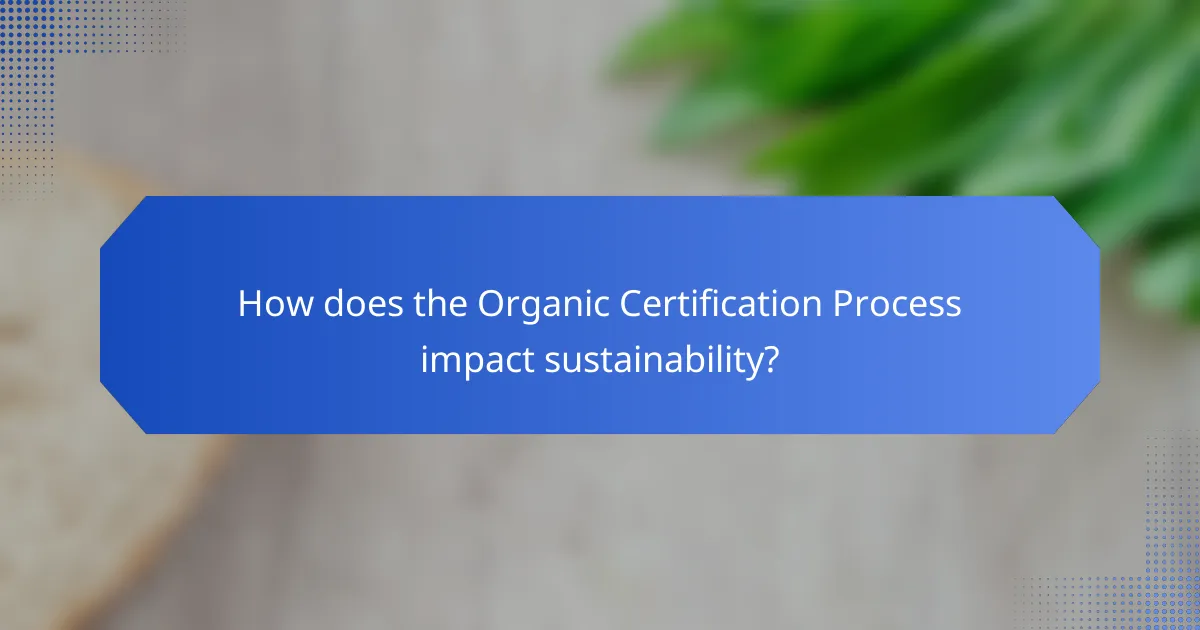
How does the Organic Certification Process impact sustainability?
The Organic Certification Process positively impacts sustainability by promoting environmentally friendly agricultural practices. This process requires farmers to use organic methods, which reduce synthetic pesticide and fertilizer use. As a result, soil health improves and biodiversity increases. Additionally, organic farming often conserves water and reduces pollution. A study by the University of California found that organic farms can enhance ecosystem services. This includes better carbon sequestration and improved water quality. Overall, the certification process encourages practices that support long-term ecological balance.
In what ways does Organic Certification contribute to environmental health?
Organic Certification promotes environmental health by ensuring sustainable farming practices. It reduces the use of synthetic pesticides and fertilizers, which can harm ecosystems. Organic farms enhance biodiversity by creating habitats for various species. They also improve soil health through practices like crop rotation and composting. Moreover, organic farming methods help conserve water and reduce pollution. According to the USDA, organic practices can lead to healthier soil and water systems. This certification supports the reduction of greenhouse gas emissions by promoting local food systems. Overall, Organic Certification fosters a healthier environment for future generations.
How do organic farming practices promote biodiversity?
Organic farming practices promote biodiversity by enhancing ecosystem health and resilience. These practices include crop rotation, which prevents soil depletion and fosters diverse plant growth. Organic farms often use cover crops, which provide habitats for beneficial insects and enhance soil quality. The absence of synthetic pesticides allows for a wider range of species to thrive. Organic farming also encourages polyculture, where multiple crops are grown together, supporting various organisms. Studies show that organic farms host 30% more species than conventional farms. This increase in species diversity contributes to better pest management and pollination. Overall, organic farming practices create a balanced environment that supports a rich variety of life.
What are the future trends in Organic Certification?
Future trends in organic certification include increased transparency and traceability in supply chains. Consumers demand more information about the origins of their food. Technology, such as blockchain, will enhance tracking capabilities. There is a growing emphasis on sustainability practices beyond current organic standards. Certification bodies are likely to adopt stricter environmental criteria. The rise of regenerative agriculture may influence certification processes. Collaboration among stakeholders will become more common. Additionally, consumer education on organic practices will expand. These trends reflect an evolving market focused on quality and environmental responsibility.
How might technology influence the Organic Certification Process?
Technology can significantly enhance the Organic Certification Process. It streamlines documentation and record-keeping through digital platforms. These platforms allow for real-time tracking of organic inputs and farm practices. Blockchain technology can ensure transparency and traceability in the supply chain. Data analytics can identify trends and compliance issues more efficiently. Furthermore, remote sensing technologies can monitor crop health and soil conditions. These advancements reduce the time and costs associated with certification. A study by the USDA found that digital tools can improve compliance rates by up to 30%. Overall, technology transforms the organic certification landscape by increasing efficiency and reliability.
What evolving consumer demands are shaping Organic Certification standards?
Evolving consumer demands are significantly shaping Organic Certification standards. Increased awareness of health and environmental issues drives consumers to seek transparency in food sourcing. Consumers now prioritize sustainability and ethical practices in agriculture. There is a growing demand for organic products that are free from synthetic pesticides and fertilizers. Additionally, consumers are interested in animal welfare standards within organic farming. The rise of plant-based diets also influences organic certification, prompting standards to adapt accordingly. Research indicates that 70% of consumers are willing to pay more for products with credible organic certifications. This shift pushes certifying bodies to enhance their standards and verification processes.
What are some practical tips for successfully achieving Organic Certification?
To successfully achieve Organic Certification, implement the following practical tips. First, understand the specific organic standards applicable to your region. Familiarize yourself with the USDA Organic Regulations if you are in the United States. Next, maintain detailed records of all farming practices, inputs, and sales. This documentation is crucial for compliance verification. Additionally, develop an organic system plan that outlines your practices and procedures. This plan should detail how you will manage your farm organically. Regularly train your staff on organic practices to ensure everyone is aligned with the certification goals. Conduct periodic internal audits to identify potential non-compliance issues early. Finally, choose a reputable certifying agent who will guide you through the certification process. Following these steps can significantly enhance your chances of achieving Organic Certification successfully.
The main entity of this article is the Organic Certification Process, which encompasses the systematic procedure for verifying agricultural products meet organic standards. The article outlines the key steps involved, including the development of an organic system plan, application through accredited certifying agents, and the on-site inspection process. It also discusses the requirements for certification, necessary documentation, and the benefits of organic certification, such as enhanced marketability and consumer trust. Additionally, the article addresses challenges faced during certification, including regulatory complexity and financial costs, while highlighting best practices and future trends that influence organic certification standards.
